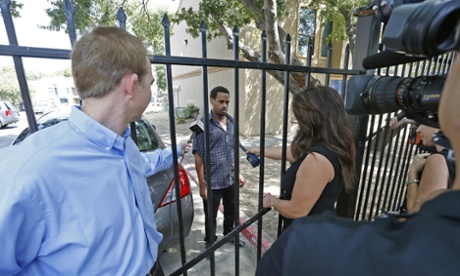Hazardous materials team arrives to clean Thomas Duncan’s apartment as officials work to rehouse other residents in the complex in Dallas

Officials in Texas were still struggling to implement an effective strategy to manage the close associates of the first person to be diagnosed with Ebola outside Africa on Friday, as the hospital where he first presented himself admitted a “flawed” initial response.
A hazardous materials team arrived on Friday to clean the apartment where four people are under quarantine, a day after a cleaning crew was forced to leave, lacking the appropriate permit. State officials were working on a plan to rehouse the residents.
Sweat-stained sheets and towels remained in the apartment for four days since the Ebola sufferer, Liberian citizen Thomas Eric Duncan, was placed in isolation at the Texas Health Presbyterian hospital in Dallas.
The hospital said that due to a “flaw” in its electronic health record workflows, Duncan’s travel history was not relayed from the nurse to the doctor on his first visit to the hospital a week ago, which is why the medical team allowed Duncan to be sent home with a course of antibiotics.
“Protocols were followed by both the physician and the nurses. However, we have identified a flaw in the way the physician and nursing portions of our electronic health records (EHR) interacted in this specific case,” the hospital said in a statement.
“As a result, the hospital has changed the workflows to highlight a patient’s travel history, especially as it relates to Ebola-endemic countries in west Africa.”
After getting progressively more ill, Duncan was taken back to the hospital on Sunday by ambulance, two days after his first visit. His Ebola diagnosis was confirmed by the Centers for Disease Control and Prevention (CDC) on Tuesday.
On Thursday, CNN revealed that his apartment had still not been cleaned. Two pickup trucks and a van, belonging to a local commercial hazardous materials cleanup company, arrived at the complex on Thursday evening. But the clean-up operation did not get under way until late Friday morning.
Four “close” family members, including a woman, Louise Troh, believed to be Duncan’s girlfriend, as well as Troh’s 13-year-old son and two nephews in their 20s, are under strict quarantine in the apartment. Local police and armed security guards have been stationed at the apartment complex to ensure compliance.
Troh told the Associated Press that she is tired of being quarantined and wants authorities to decontaminate her home. “Who wants to be locked up?” she said.
“The challenges are real,” said Tom Frieden, director of the CDC, on Friday. “I am confident that we will get it sorted out today,” he told ABC’s Good Morning America.
Health officials obtained a formal order to force the residents to stay at home, after admitting they had not complied with a voluntary request to do so on Wednesday.
In the latest estimate by health officials in Texas, between 12 and 18 people may have come in direct contact with Duncan, including five school-age children.
The children, who are not showing symptoms and are therefore not contagious, attended school Monday and Tuesday. On Wednesday, a day after it was confirmed that Duncan had tested positive for Ebola, one of the five children showed up for class at a middle school.
“We’re not sure why the Tasby student showed up for school on Wednesday but, once he was identified, he was asked to go to the nurse’s office so that a parent could be contacted,” the Dallas independent school district spokesman André Riley said in an email.
“During the limited time he was on campus, he showed no symptoms yesterday either.”
Those identified as possibly having made direct contact with Duncan, including the children, are being monitored, a procedure that includes taking the person’s temperature twice a day. Local, county and state officials, aided by a team from the CDC are working from a list of 100 potential or possible contacts, which will narrow as their investigation continues.
Duncan’s neighbours in the Liberian capital, Monrovia, believe he became infected when he helped a sick pregnant woman, who later died of Ebola, a few weeks ago. It was not clear if he knew of her Ebola diagnosis before departing for the US.
Authorities in Liberia have said they intend to prosecute Duncan if he recovers and attempts to return. Duncan filled out a form at the airport in Monrovia on 19 September, which asked whether he had cared for an Ebola patient or touched the body of anyone who had died in an area affected by Ebola. He answered no to all the questions.
Meanwhile, the parents of an American freelance journalist diagnosed with Ebola in Liberia said on Friday that there son was “scared” but remained in “good spirits”.
Ashoka Mukpo, 33, was hired this week as a cameraman for NBC’s chief medical editor and correspondent Dr Nancy Snyderman. He is scheduled to return to the US this weekend for treatment.
“Obviously he is scared and worried,” Dr Mitchel Levy said, appearing on NBC’s Today show with his wife, Diana Mukpo. He added: “But his spirits are better today.”
Snyderman said on Twitter that she and her team will return to the US on Sunday. The president of NBC News, Deborah Turness, said they will be placed in isolation for 21 days as a precautionary measure.
